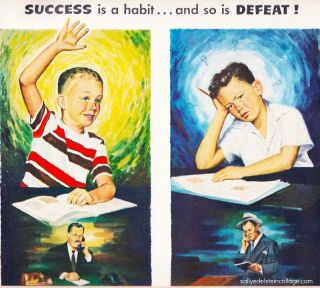Play
The Number One Thing We Often Forget to Teach Our Children
Hint* it isn't found in a book
Posted November 17, 2014

As a new-ish mother of one year old twins, I am continuously inundated with all the latest ways I need to "should" all over myself. I "should" be teaching them Kumon. I "should" be enrolling them in a montessori day care. I "should" be having them learn a second language while their brains are plastic. I "should" only be feeding them organic foods. I "should" not be allowing them to watch any TV, media, of any sort as not to fry their delicate little hardware.
I listen to moms talk about how advanced their children are: "He was walking three days after he came home from the hospital," or "She knew her abc's before her first birthday!" I can recall back to my childhood, sitting in front of the math and reading practice books my parents would buy me before I had even entered Kindergarten.
Similarly today, as a society- we place such an emphasis on what we have "done." "Where did you finish school?" "What do you do for work?" There is so much importance placed on us being human doings instead of human beings.
As a therapist who works in a fiscally successful community, filled with people who are very good at "doing," the most common observation is the lack of emphasis on simply being. More importantly- the joy of being.
We were born out of a generation of do-ers. Education and academic achievement were continuously

pounded into our parents' psyches as "the way out," or at least a guarantee that their children would not have to worry about money. That their childrens' lives would be better than their own. The American Dream.
However, somewhere along the way- joy was left on the side of the road. An underlying assumption existed that once we got our degrees, our titles, our brass rings, our 401K's in place- joy would be waiting for us at the end, like a pot of gold.
One of the most commonly sought out concepts from my clients is joy. Sure, they may not come in articulating that specifically as their treatment goal. It usually goes something like "I feel like I got everything I was supposed to get- but something still feels like it is missing," or "I should be happy, and none of my friends would know it- but I just feel like I got off track somewhere," "is this truly happiness?"
Unfortunately, many look towards their partners, psychotropic medication, material items, addictive behaviors to make themselves feel better. The double edged sword is that while temporarily gratifying, these ill-conceived notions often leave us with a bigger hole of dissatisfaction in the end.
So how then, do we change this legacy for ourselves? For our children? In Shefali Tsabary's book "The Conscious Parent," she notes that we are not able to give to our children what we do not have. Therefore, if we can't access our own joy- we won't be able to give this to our children. Therefore, it is even more important that we learn to cultivate joy for ourselves, first.

Below are my top eight ways for cultivating joy in your life:
1) Create a list in your phone of the top 10-20 things that bring you a sense of fun, excitement, contentment, play, whimsy and schedule a daily alarm to do at least one of those things each day (you will need to continually update this list to make sure there is enough variety)
2) Remove all toxicity that can be draining the joy reserves from your life (friends, toxic environment, destructive behaviors). For instance, if you indulge in a glass or two of wine every night- that can be a real joy killer. Alcohol has been scientifcally proven to depress our central nervous systems.
3) Create a list of all those people in your life that fill you up...make a weekly habit to contact atleast two to three of the people in your list. Research shows that the happiest among us have healthy interpersonal relationships that they continue to strengthen on a weekly basis.
4) Make music part of your every day life. I don't care if it is heavy metal that makes you feel carefree and joyful- just do it on the daily.
5) Create a practice of benevolence aimed thinking. Most mornings, people wake up thinking "what do I need today?" "what more do I need to get?" However, much of the happiness research shows that those who tend to have an others-focused mindset- tend to be the most fulfilled. Create a habit of shifting from self to other when you are feeling bogged down and in a rut.
6) What are you doing that is different than what you have been doing for the last 365 days? Our brains are hardwired to become depressed when they are no longer learning. Aim to do something new for your noggin' at least once a month, whether it be learning a new language, dance class, or finally cashing in that groupon for a beginners surfing class.
7) I hate to sound like a broken record- but exercise is a must if you are to feel good. If you don't physically use the cortisol we all build up during the day with normal stressors- it is next to impossible to create sustaining joy in our lives.
8) Don't take yourself so seriously. Start to detach your self from your ego. What do you over identify with? Being smart? Being tall? Being rich? Being well-educated? An ancient proverb states that all streams flow to the basin and it is true that once we lower ourselves to others, they tend to want to come towards us rather than away.

Once you've got this down for yourself, here is how you can begin to access your own joy and give it to your kids:
1) Make sure you don't have your kids on too much of a schedule- is there time for free play? can you really be in the moment of play with your kids, getting lost in their wonderment of this new world around them?
2) When your kids act silly, do you tell them to straighten up- or do you rejoice in their joyousness? Make sure you are making a daily point to embrace their little spirits, no matter how they may express joy.
3) For older kids- instead of limiting your conversations to "what did you do in school today," you could add "when did you feel the happiest today?" Helping our kids to reminisce on positive memories and experiences sets an early practice/habit of focusing on what we are greatful for...
4) Encourage your kids to always play. Of course, this doesn't take a lot of arm tugging when they are little- but making sure they maintain this habit well into their pre-teen and teen years can set them up for maintaining the habit when they are adults.
5) When your children walk into the room, does your face light up? or are you expeditiously giving them a once over, scanning for an unbuttoned shirt, an unwashed face, or unkempt hair? Our faces should convey to our children what we feel in our hearts, not what we think in our heads.
6) Cultivate a practice of heart based living in addition to head based thinking. Of course, we have to use our heads to look both ways before crossing the street, to pay our bills, to make meetings, etc. However, we must also develop a practice of living and feeling within our heart space, connecting and opening up to others, and feeling the full spectacle that is part of human BEING.
7) Check our judgements at the door when it comes to our kids. There is a saying by Khalil Gibran that goes "your children are not your children. They are the sons and daughters of life's longing for itself. They come through you, but not from you. You may give them your love, but not your thoughts - for they have their own thoughts.You may house their bodies, but not their souls. For their souls dwell in the house of tomorrow, which you cannot visit- not even in your dreams." I love this so much because it speaks to the fact that we must let our children be their own unique spiritual selves- not the selves we envisioned for our children. Not mirrors, reflecting only the positive attributes of our selves we allow others to see on facebook and instagram.
You may be a terrific athlete, housing a future artist. You may be a brilliant scientist, housing a future class clown. Whatever blessing(s) this universe has bestowed upon you- honor it. Don't destroy it or squelch it's spirit with your own agenda.
True joy is feeling the sense of wholeness and acceptance no matter who we are. That sense of acceptance can be cultivated through our own work as adults, but it is much easier when our parents relayed it to us. That idea that we are loved just as we are.
If joy is something you've been missing in your life- what better time than this holiday season to begin cultivating it for yourself and your family.
Dr. Colleen Long is the author of Happiness in B.A.L.A.N.C.E; What We Know Now About Happiness as well as Meditation Medication. She is a licensed clinical psychologist and couples therapist with practices in Los Angeles and Manhattan Beach, California. You can follow her on twitter or facebook, or visit her practice website or self help website if you are outside the state of California.




